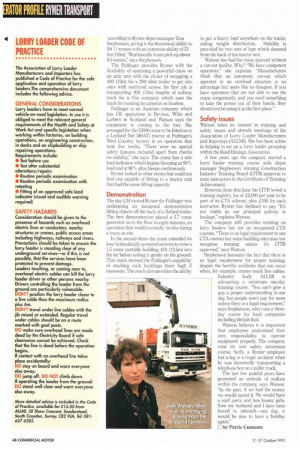according to Rymer depot manager Tom Stephenson, giving it the
Page 52

If you've noticed an error in this article please click here to report it so we can fix it.
theoretical ability to lift 11 tonnes with an extension ability of 53 feet (16m). "Realistically it can pick up about 8.5 tonnes," says Stephenson.
The Palfinger provides Rymer with the flexibility of operating a powerful crane on an artic unit with the choice of swapping a 40ft (12m) for a 20ft (6m) trailer to get into sites with restricted access. Its first job is transporting 40ft (12m) lengths of railway track for a film company which uses the track for running its cameras on location.
Palfinger is an Austrian company which has UK operations in Devizes. Wilts and Larbert in Scotland and Watson says the equipment is coming to the fore. She arranged for the 33000 crane to be fitted on to a Leyland Daf 380ATi tractor at Palfinger's West Country factory in an operation that took five weeks. "There were no special safety features included apart from checks on stability," she says. The crane has a safe load indicator which begins bleeping at 95% load and at 98%-plus bleeps continuously.
Rymer looked at other cranes but could not find one capable of fitting to a tractor unit that had the same lifting capacity
The day CMvisited Rymer the Palfinger was undergoing an inaugural demonstration lifting objects off the back of a flatbed trailer. The first demonstration placed a 5.7 tonne generator on to the floor in eight minutes, an operation that would normally involve hiring a crane on site.
In the second demo the crane extended its four hydraulically powered sections to raise a 1.5 tonne portable building 41ft (12.5m) into the air before setting it gently on the ground. This reach showed the Palfinger's capability of stacking such buildings three high if necessary. The reach also provides the ability to put a heavy load anywhere on the trailer, aiding weight distribution. Stability is provided by two sets of legs which descend from the back of the tractor unit.
Watson has had the crane specced without a cutout facility. Why? "We have competent operators," she explains. "Manufacturers think that an automatic cut-out which operates in an overload situation is an advantage but users like us disagree. If you have operators that are not able to use the crane competently, and you need something to take the power out of their hands, they should not be using it in the first place."
Watson takes an interest in training and safety issues and attends meetings of the Association of Lorry Loader Manufacturers and Importers (ALLMI). She has been active in helping to set up a lorry loader grouping within the Road Haulage Association.
A few years ago the company started a lorry loader training course with depot manager Stephenson winning Construction Industry Training Board (CITB) approval to train instructors in the Certificate of Training Achievement.
However, from this June the CITB levied a training registry fee of 12,000 per year to be part of its C'I'A scheme, plus £100 for each instructor. Rymer has declined to pay. "it's not viable as our principal activity is haulage," explains Watson,
The company still provides training on lorry loaders but not on recognised CTA courses. "There is no legal requirement to use crA courses but some building sites may not recognise training unless it's CITB approved," says Watson.
Stephenson bemoans the fact that there is no legal requirement for proper training, despite the horrific accidents that can occur when, for example, cranes touch live cables. Industry body ALIJA is advocating a minimum one-day training course. "You can't give a guy a proper understanding in one day, but people won't pay for more unless there is a legal requirement," says Stephenson, who runs a threeday course for local companies including British Rail.
Watson believes it is important that employees understand their own responsibility to operate equipment properly, The company runs its own safety awareness course. Sadly, a Rymer employee lost a leg in a tragic accident when he was incorrectly transporting a telephone box on a pallet truck.
The last few painful years have promoted an attitude of realism within the company, says Watson. "In the past, if we had the money we would spend it. We would have a staff party and hire bunny girls. Now my husband and 1 have been forced to retrench—one day, it would be nice to have a holiday again."
































































































